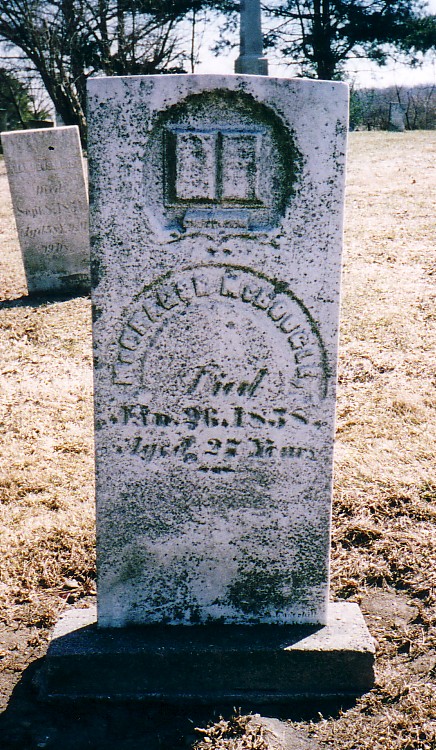
The Life
and Death of McGregor McDougle
(aka
Gregor McDougle, Blackhawk)
Parts
are from the History of the Regulators
Published
by the Order of the Central Committee
Charging the said Gregory
McDougle with murder, do recommend that the said McDougle be hung by the neck
until dead, on
Gregory McDougle
was the son of Lachlin McDougle and Eliza Mary McGregor, born in 1831 in

George McGregor
Her brother
George was married to Sophia Huffman and had a daughter Georgianna McGregor,
who married to J. Edgar Simpson and was the mother of Lillian Melinda (Simpson)
Hayes.

J. Edgar Simpson and
Georgianna McGregor
Lillian M.
(Simpson) Hayes married to Ben E. Hayes, and had the children of George,
Eugene, Bennie, Ardis and Victor. This
is the generation that most of us are familiar with. Victor was my grandfather.

Lillian M. (Simpson) Hayes
Gregor McDougle
became to be known as one of the most notorious criminals in
On the night of
Report to of the
Committee
We, the
committee appointed by the Noble County Invincibles to collect and investigate
the evidence in the case of Gregory McDougle, now pending before this Society,
ask to make the following report:
“After having
made a full and fair investigation of all the testimony, and having found,
during the said investigation, evidence of an unmistakable character, charging
the said Gregory McDougle with murder, do recommend, that the said McDougle be
hung the by neck until dead, on Tuesday, the 26the day of January, 1858, at 2
o’clock P.M. “
The report, on
motion, was received and adopted.
Immediately upon
the adoption of the report, a deep and profound silence pervaded the whole
assembly. Each felt that the eve of an
awful crisis was at hand. The fearful
responsibilities of the decision of Death, upon a fellow being, without the sanction
of any other law except that of the natural right of self-defence, were now
vividly portrayed in the mind of every member of the committee. No turbulent jar, or discordant voice was
heard to mar the fearful deliberations of that hour. Calmness and solemnity was visible upon every
brow. A more calm, well matured and
deliberate decision, was never made by any judicial umpire in the history of
criminal jurisprudence. The following
resolution was then passed:
“Resolved, That
the Captains of several Companies, in Noble and adjoining counties, notify the
members of their Companies respectively to appear at Ligonier on the day of
execution, at the hour of 12 pm, and that each Captain be requested to escort
his own Company into the village, in regular file and good order”.
During the
pendency of the case of McDougle before the Noble County Invicibles, a more
exciting and thrilling interest was never manifested by the citizens of Noble
County. Buggies and wagons were
constantly on the move and fro, and not a day passed, for the space of one
week, but the cars were filled almost to overflowing with passengers to and
from Ligonier. The case of McDougle
formed the topic of conversation at every corner of the streets. The movement of the Regulators now made, what
before had seemed but the momentary excitement of the mass, a serious reality,
upon which were suspended the awful issues of life and death. They felt that their natural and God-given
rights had been disregarded, and that the arm of the law was too weak to mete
out a just retribution to the guilty, under the existing state of the
society. Hence they virtually said “The
axe is now laid at the root of the tree, and every tree that bringeth not forth
good fruit shall be hewn down”.

The following is an account of the
execution of McDougle, and published by the Noble County Register and is
substantially true according to original record:
EXECUTION
OF GREGORY McDOUGLE
At
The 26th
of January, 1858, is a day long to be remembered by the citizens of Noble and
adjoining counties, as being the day on which was executed Gregory McDougle,
and we shall endeavor to give such facts as shall make the reader acquainted
with all the attending circumstances.
It is a well
known fact, that for years our County and Lagrange have been known, hundreds of
miles, as the dens of blacklegs of every conceivable grade; and honest
citizens, while from home, have hardly dared own their place of residence, for
fear of being looked upon as one not safe to run at large, and as the sequel
will show, not without cause. Years
since, while our country was new and hiding places plenty, the notorious Latté,
Hill, Ulmer & Co., formed their nucleus near the Tamarack, as a place to
which all might meet to take counsel, lay plans, manufacture counterfeit money
and be safe from harm. For years their
gang in a measure, controlled our election, sat upon our juries thus rendering
the laws of no avail. Year after year
has passed away and the same state of things has continued. Our horses, buggies, harness and other
property, have been stolen by the wholesale; our stores broken and goods
taken. Our citizens have been meet by
the highwayman and at the pistol’s muzzle robbed, and in one instance stabbed;
and so well were their plans laid that their detection seemed impossible.
Thus, for years,
have this banditti pursued their course.
No man or his property was safe while this gang remained in our
midst. If, by chance one was arrested,
he would be released by his comrades, or break jail, go on inadequate straw
bail, or if held to court, be sworn clear by his confederates under the alibi
dodge, until our citizens lost all hopes as to the laws accomplishing the
desired result.
By a chain of
fortuitous circumstances, a short time since, the gang, their numbers and
places of deposit, became known, when a Committee of Vigilance was formed to
bring them to justice. The result was
that some twenty-five were arrested, and of the number fourteen are now in jail,
well guarded. During the investigation
it became known that one of the gang, a former accomplice of the notorious
Townsend, one Gregory McDougle, alias Gregory McGregor, Geo. McLane, Geo.
Bates, was in custody of the Court.
A man who, by his own confession,
was born in Wallaceburg, Kent County, Canada West, in the year 1831, where he
commenced his career of crime by breaking the Chatham jail, where his brother
was confined, robbing the jailors wife of a purse of gold; also robbing a
schoolmaster of a watch on the ice, and names of other affairs in Canada,
details which stamp him as one of the most desperate and hardened villains that
the annals of crime present.
Since April
last, he with two others, have stolen no less than thirty four horses, broke
two jails, robbed four stores, and two tanneries, took the entire load of two
peddlers, besides a large amount of harness, saddles, buggies, and other
property too numerous to mention; who publicly boasted that no jail could hold
him, and that he feared neither God, man or the devil. Further, there seems to be other and deeper
acts, which he did not confess, and which we will briefly detail.
The Deputy U.S.
Marshal of Michigan states, under oath, that he has had in his possession for
some time, a reward form Canada for the apprehension of this man, for the
crimes of robbing, an attempt to break jail and murder. McDougle confesses to his identity in the
acts of robbing and attempt to break the jail at
McDougle also
confesses to robbing a schoolmaster on the ice but denies his murder. We have, from the same authorities and
others, that the schoolmaster was not only robbed, but murdered and found dead
on the ice.
One other crime
we will mention, and close this harrowing and sickening detail. This former confederate, heretofore
mentioned, states that McDougle informed him, that he and other accomplice,
hearing of a Scotchman that had received quite a sum of money, proceeded to rob
him of the treasure. With pistol to
their victims breast they demanded his money.
He told them that he had deposited it in bank. After a search, and not believing his
statement, they proceeded to divest him of what clothing was necessary, and
procuring live coals roasted a fire upon them.
They released him before death occurred, becoming satisfied that their
victim had told them the truth.
McDougle, in his confession, qualifies by saying, that he held his
accomplices horses, while they did the act.
We leave our readers to judge of the executed man’s complicity in these
acts.
Proofs being
positive, a jury of citizens, (not a jury of twelve, but a jury of hundreds,)
decided that justice required that he die; and on this memorable day he was
executed; not by a rabble, not by a nosy mob, not by young men in the heat of
passion, but by men who for years have been residents of this and the adjoining
counties, - men that were impelled, not by a thirst for blood, not to riot in
the agonies of one made in the image of the God they worshipped, but that stern
justice be demanded the offering as an example to the young in their midst,
many of whom have already the solemnity of the hour; all would have gladly have
had it otherwise, if justice could have been satisfied through any of other
chancel; but all felt that his was the only resort. During the fore part of the day he was
visited by two clergymen, who endeavored to point his thoughts to Him who holds
the destinies of man in His keeping, and who is free to forgive all, even to
the most guilty.
Gregory McDougle
was brought before the committee on the evening of the 25th of
January, when he was informed for the first time, of the doom that awaited him
– that he was to be executed the next day at
After a short
exhortation and prayer by the Rev. Mr. Wolcott he made the following:

CONFESSION
“I was born in
“About six weeks
after Latta came, and proposed to John McDougle, Sherman Mallett and myself
that he would furnish us with some counterfeit money if we would get some
goods. We went to
Mallett went
into the factory at
We went from
there to Penn Yan and took the cars for Rochester; stayed there a while;
finally went back to Baker’s and broke open his wagon and stole seventy or
eighty dollars worth of goods. We then
went to Chemung and stole Joseph Howard’s horse, and went back to Bakers and
stole his two mares, sleigh, double harness and a set of single harness; we traded our sleigh and harness off for a
wagon to a man by the name of Reed, in
I next went to
On my return I
became acquainted with Payne through Burnam.
We went to
A man by the
name of John Wilson stole Spencer’s horses and took them about thirty five
miles north of Cincinnati, and sold them to an old farmer, and them pulled a
pair of brown horses, and brought them to Burnams and put them to my wagon,
drove them to Detroit, then shipped them to Dunkirk and drove them to Thomas
Reed’s in Chautauqua County NY. I took a
mare and colt from Burnams to
I traded a horse
to _______ he is with us. I gave him
counterfeit money, and he told me he passed it; he was initiated before I saw
him. These men are the kind of men that
are the cause of so many horses being stolen.
Also _______, I would not be afraid of his exposing me if he knew I had
stolen a horse. Stealing from the
peddler at
On being
questioned he stated that he robbed a man by the name of Alexander McCoy of a
watch on the ice at Wallaceburg soon after I tried to get my brother out of
jail. I ran up behind him and pulled his
watch, when he fell down on the ice but he was not hurt. He came to my house the next morning for a drink.
Upon being
questioned in regard to a certain Scotsman, robbed in the western part of
Ligonier – Hank Core stole Storm’s buggy.
It is on the
Lagrange –
Constable Louther deals in counterfeit and horses. James Pitts signs the bills on Pretty
Prairie; Ad Nimmons used to Misner signs his own. There is an old man that usually stops at
Perry Randolphs, he cuts their plates, or does their engraving, I think he is
there now. John Goodrich secretes stolen
horses, he secreted two for me at different times. He also deals in counterfeit. He asked me for it. Holsingers horse was taken by Hunt and sold
to Wm. Hall, four miles from
McDougle was at
Burnames in December 1857. He saw Dr.
Hogan and Hogan said that he had sold Burnam a Christmas collar and if he let
Burnam have $00 or $500 whose business was it?
Dr. Hogan was at a part at Ben Wilsons.
Payne was there. Payne let Hogan
have a quantity of counterfeit to keep till after the dance. Payne had $900; Hogan knew it was
counterfeit money.
McDougle has seen Meeker there counterfeiting at different times; seen him at
Burhams coloring counterfeit. James
Clark, a baggage master on the railroad at
Johanthon
Thompson makes and peddles spurious coin; lives in Kinsman,
Wm. Thompson,
used to be Sheriff in Chemung Co. NY, John Thompson, Henry Thompson, out west,
Charles Hibbard keeps tavern, all of the same place and John Rosenkraus think
he lives in

HIS APPEARANCE
McDougle,
throughout the period of his confinement, up to the time of communicating to
him his awful doom, seemed perfectly careless and hardened, and, in fact his
bearing and manner were defying. He made
several derisive remarks about the proceedings of the Regulators – stated that
he was not to be, and could not be frightened.
He seemed at times to regard the persons about him, and all attempts to
get a confession from him , were marked with contempt. His remarks were often profane as well as
insulting – sometimes he would maintain a dogged silence to all inquiries made
of him.
After being
informed of the doom that awaited him, he seemed to wake up to a new and
entirely different feeling.
The writer of
this witnessed the parting interview with his wife and child – a babe of near
of year old. His wife had reached him
about
McDougle was
composed but weeping freely, and lamenting his fate. His wife, in view of this last interview upon
earth with the husband of her youth, seemed inconsolable. Her ejaculations of grief and sorrow were
almost unmanning. She begged to go with
him. He told her that it would not
do. Once or twice he started from the
embrace of his wife, remarking that he would have to go as “they were waiting
for him”. He urged her to train up their
child in the “way it should go”. The
babe participated in the sadness of the scene; it caught the reflex of grief on
the countenances of those around it.
McDougle, brushing away the tears, hushed his babe affectionately and fondly
and bidding a last adieu, he slowly left the room for the carriage, which
awaited him in front of the hotel. He
was seated with a clergyman and three or four other gentlemen, and once driven to the place of execution,
followed by a large cavalcade of horseman, and other in carriages and on
foot.
They arrived at
the place of execution at about
The following is an abstract of his
remarks for a report which we are indebted to our friend A.B. Miller, Esq:

REMARKS
OF McDOUGLE
“I am happy to
see such a crowd around me, and I hope that all young men will take a warning
from me. My old father and mother
advised me to do good. I never committed
murder. They say that I killed a man and
woman in

Note – The
confession of McDougle is given as he gave it in, after the sentence of death
was passed upon him. It is proper to say
that it is not considered full. The time
was short, sixteen hours, that he had to relate his misdeeds, and where he
disposed to give a full and honest account, the overwhelming horror of his
situation would tend to cause him to confuse and disconnect his statements, and
also, in the multitude of his crimes, to pass over many acts, some of which he
adverted to in conversation with clergymen and others. There are some crimes committed by him in this
section of country, which are well known, which he as not mentioned in all of
his confession. These will be given in future,
accompanied with the statement of his former accomplice. This sheet is compiled to satisfy the public
demand, and is given as the superficial view of the matter at present.
The wife of
McDougle, subsequent to his execution, proved to be a very important witness in
many cases. She manifested, however,
great reluctance to having any publicity given either of her name or the
execution of her husband, stating as a reason that her parents were still
living, and she did not wish them to know anything of her misfortunes. She said she never intended to let them know
where she was.
Several letters
were received by the Regulators, from different parts of the Country,
confirmatory of the statements of McDougle in reference to his own crimes, one
of which is given below:
Mr. Postmaster,
As I have just read an account of the
execution and confession of Gregory McDougle, at your place on the 26th
of January last, and has many have no confidence in such confessions made at
such times and under such circumstances, I thought I would write and let you
know that all those acts, except the horse stealing, which he says transpired
in this country are true. His statement
in reference to the store which was broken in
F. C. Chamberlain, P.M.
